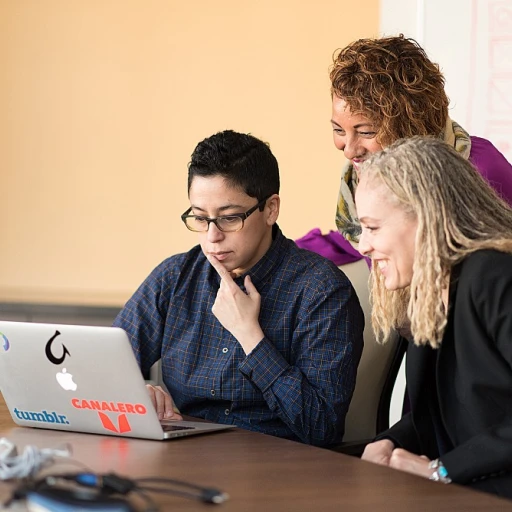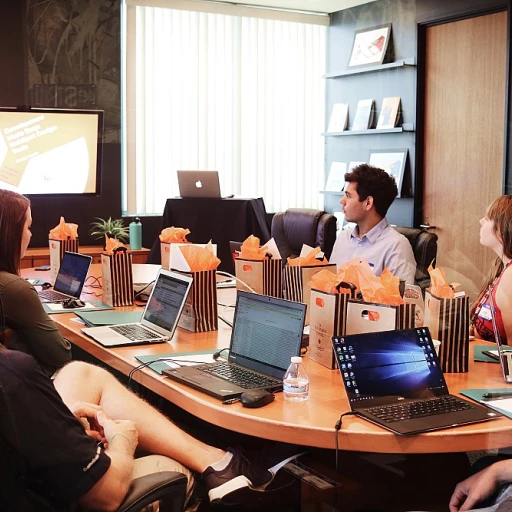
The Growing Need for Soft Skills in the Workplace
The Rising Demand for Soft Skills in Modern Work Environments
As the professional landscape continues to evolve, the importance of soft skills is becoming increasingly undeniable. Employers are placing a tremendous value on competencies such as communication, teamwork, and emotional intelligence, recognizing that these skills are essential for the success of their businesses and the fulfillment of their employees.
With technology advancing rapidly (a phenomenon discussed in detail later), technical skills alone are no longer sufficient to thrive in today's workplace. The ability to adapt, collaborate, and engage effectively with colleagues and clients is what sets successful individuals apart.
Moreover, the nature of work itself is shifting, as organizations emphasize more on project-based and cross-functional teams which demand seamless interaction and interpersonal prowess. Hence, the traditional focus on hard skills is markedly transforming into an appreciation for these human-centric abilities.
However, this burgeoning necessity for soft skills has surfaced a noticeable gap in the workforce, a challenge we're observing through the feedback employers provide (a topic explored in another segment of this blog). Many professionals find themselves needing to bridge their own inadequacies in areas previously underestimated, leading to a growing call for targeted resources and training programs.
In coming sections, we'll delve further into how individuals and institutions are addressing these skills deficits, highlighting personal narratives and educational initiatives that aim to fill this critical void.
Identifying the Skills Gap: What Employers Are Saying
Understanding Employer Concerns About Soft Skills
In today’s dynamic workplace, there is a growing demand for individuals who excel not only in technical proficiency but also in soft skills. As organizations adapt to the rapid changes brought on by technology and globalization, employers are increasingly vocal about the missing link: the essential soft skills that drive team collaboration, communication, and innovation. According to numerous surveys and studies, employers have identified a palpable gap in skills like problem-solving, adaptability, and emotional intelligence among job candidates. This deficiency is often highlighted during recruitment and performance evaluations, where technical skills may shine, but interpersonal skills frequently rank as areas in need of improvement. Employers are not just passively observing this deficiency; they are actively voicing their concerns as they witness the impact of the skills gap on productivity and workplace culture. The lack of essential soft skills often results in misunderstandings, conflicts, and a slow-down in initiatives that require collaborative efforts. Employers stress that while technical skills are foundational, the ability to navigate complex interpersonal dynamics is what ultimately drives business success. The awareness of this gap has led companies to put measures in place to address it. This includes investing in training programs specifically tailored to enhance soft skills. These initiatives are part of a broader strategy that also involves reassessing hiring practices and performance metrics to give greater weight to interpersonal competencies. As the demand for a skilled workforce continues to grow, bridging this gap becomes crucial for maintaining a competitive edge. Businesses, therefore, must focus on creating an organizational culture that values and nurtures these traits, ensuring that employees are equipped not only for the tasks at hand but also for future challenges in a rapidly evolving work environment.The Impact of the Fourth Industrial Revolution on Skills Development
The Impact of Technological Advancements on Skills Acquisition
As we embrace the dawn of the Fourth Industrial Revolution, characterized by rapid technological advancements, the workplace is undergoing a transformation. This evolution is not just reshaping industries, but also redefining the types of skills required to thrive in today’s economy. While technical prowess is often highlighted, the importance of soft skills is increasingly coming to the fore.
Technologies such as artificial intelligence, machine learning, and automation are altering traditional job roles, making human-centric skills such as empathy, communication, and adaptability more valuable than ever. Employers are expressing a growing need for workers who possess these flexible, non-technical abilities that machines cannot replicate.
In previous sections, we've examined the rising demand for soft skills and the skills gap from an employer's perspective. Employers are recognizing that the ability to demonstrate interpersonal skills and emotional intelligence is as critical as technical expertise. This shift creates a unique opportunity for workers to invest in developing their soft skills, adapting to the evolving demands of their roles.
With ongoing advancements, the pace of change is unlikely to decelerate. As new technologies emerge, they bring with them the necessity for a workforce that is not only technically skilled but also agile and capable of lifelong learning. Thus, it becomes crucial for both organizations and individuals to prioritize the cultivation of soft skills. This topic is explored further in our comprehensive discussion on acknowledging and addressing the skills divide.
In the upcoming sections, we'll delve into strategic approaches to soft skills training and share personal stories of workers who have successfully bridged their own skills gaps. We will also discuss the vital role of education and continuous learning in the journey of skills enhancement.
Strategies for Soft Skills Training and Development
Building a Pathway to Excellence in Soft Skills
In today's rapidly evolving workplace, fostering a culture of soft skills training and development is more important than ever. The growing need for these skills, highlighted by employers, necessitates a proactive approach to equip the workforce effectively. This focus not only aids in career progression but also enhances organizational success. One of the most effective strategies for developing these essential skills is through targeted training programs. Companies can implement workshops and seminars tailored to team-building, communication, emotional intelligence, and problem-solving. These programs can be integrated into regular professional development sessions to ensure continuous improvement. Mentorship programs also play a significant role in soft skills training. By providing less experienced employees with access to seasoned professionals, organizations can create a learning environment that fosters personal growth and knowledge sharing. Mentors can offer insights into navigating complex social interactions and encourage mentees to apply new skills in their work environments. Moreover, organizations can leverage technology to enhance soft skills training. Virtual reality and online platforms can simulate real-life scenarios, allowing employees to practice and hone their skills in a safe, controlled setting. This innovative approach caters to diverse learning styles and can significantly improve engagement and retention. Encouraging a feedback-rich environment is another powerful tool in bridging the soft skills gap. Regular constructive feedback helps employees identify areas for improvement and offers guidance on how to enhance their skill sets. This approach not only fosters a culture of continuous learning but also empowers employees to take control of their professional development. Finally, it's crucial to recognize the individual efforts of workers who take the initiative to bridge their own skills gaps, which can serve as motivation for others. Personal stories of transformation within the workforce can inspire peers and highlight the tangible benefits that soft skills development can bring. By employing these strategies, organizations can effectively navigate the challenges of the Fourth Industrial Revolution and create a workforce that thrives on adaptability and collaboration. Through dedicated training and a supportive learning environment, the gap in essential soft skills can be successfully bridged, leading to a more competent and resilient workplace.Personal Stories: Workers Bridging Their Own Skills Gaps
Real-Life Experiences of Overcoming Soft Skills Challenges
In the rapidly evolving job market, personal stories of individuals who have successfully navigated their own skills gaps offer valuable insights and inspiration. These narratives highlight the importance of adaptability and continuous learning in mastering essential soft skills, as discussed in earlier sections.
Take the example of Sarah, a project manager in a tech company. Initially, Sarah excelled in technical expertise but struggled with communication and teamwork. Recognizing the need for improvement, she enrolled in workshops focusing on active listening and conflict resolution. Over time, Sarah's ability to effectively communicate and collaborate with her team significantly improved, leading to more successful project outcomes and a promotion.
Similarly, James, a mid-level manager in a retail chain, realized his leadership skills were lacking. His company encouraged him to participate in a leadership development program that emphasized emotional intelligence and decision-making. By embracing these learning opportunities, James transformed his management style, resulting in a more motivated and cohesive team.
These stories underscore the critical role that self-awareness and proactive learning play in bridging soft skills gaps. They also reflect the broader themes of the Fourth Industrial Revolution's impact on skills development and the strategies for soft skills training and development. As industries continue to evolve, the ability to adapt and grow these skills remains a key driver of career success.
The Role of Education and Continuous Learning
Education Systems Adapting to New Demands
As the workplace continues to evolve, the role of education in addressing the skills gap, especially in soft skills, becomes increasingly crucial. Educational institutions are now tasked with preparing students not just with technical knowledge, but with the interpersonal and communication skills that employers are clamoring for. The growing need for soft skills in the workplace has prompted schools and universities to rethink their curricula, integrating courses and activities that foster critical thinking, collaboration, and emotional intelligence.
Continuous Learning: A Lifelong Commitment
In the face of rapid technological advancements and the impact of the Fourth Industrial Revolution, workers are finding that continuous learning is essential to stay relevant. This era demands adaptability, and individuals must take charge of their own development by seeking opportunities for growth beyond formal education. Online courses, workshops, and seminars are becoming popular avenues for acquiring and honing soft skills, allowing workers to bridge their skills gaps effectively.
Collaborative Efforts for Skill Enhancement
Collaboration between educational institutions and businesses is key to creating a workforce equipped with essential soft skills. By working together, they can design programs that address the specific needs of industries, ensuring that graduates are ready to meet the challenges of today's job market. Employers can also play a significant role by offering internships and mentorship programs that provide real-world experience and guidance.
Ultimately, the journey to bridging the skills gap in soft skills is a shared responsibility, requiring commitment from both individuals and institutions. By fostering a culture of continuous learning and collaboration, we can equip the workforce with the tools they need to succeed in an ever-changing environment.









